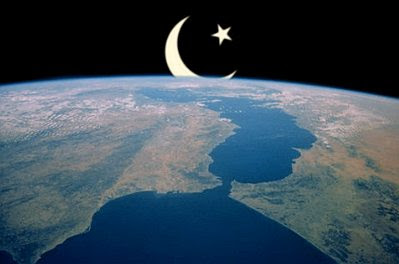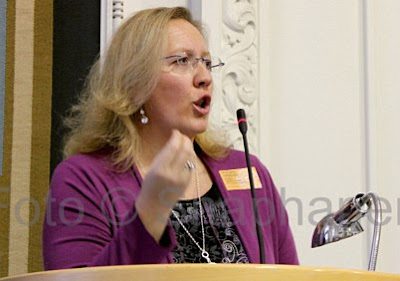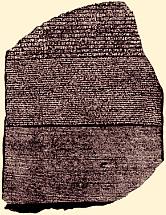Forty-five years after his death, springtime has finally come for Sayyid Qutb and Egypt.
Mr. Qutb took over as leader of Al-Ikhwan Al-Muslimeen — better known as the Muslim Brotherhood — in 1949. He succeeded its founder, Hassan al-Banna, after the latter was assassinated by King Farouk’s government. Mr. Qutb himself was hanged by Nasser regime in 1966, but by that time he had become a popular and influential writer, read by millions of Egyptians and other Muslims. He was the principal theoretician of the modern Islamic revival, and his works have continued to inspire Muslim readers since his death. From Yogyakarta to Casablanca, from Dushanbe to Abuja, in Arabic or translation, Sayyid Qutb remains the most popular writer of fundamentalist Islamic literature.
The patience of the Muslim Brotherhood has been rewarded at last. With the exception of Algeria — where the military is still keeping the fundamentalists from gaining control — Ikhwan regimes have been installed in power across the whole of North Africa. The Brotherhood took control in Libya thanks to NATO’s destruction of the Qaddafi regime, but the other countries have chosen it through the ballot box. Tunisia elected Ennahda, an MB affiliate, just a few weeks ago. But the country hasn’t settled into a stable, peaceful situation as a result — Islamic fundamentalists continue their violent demonstrations, demanding the abolition of the country’s remaining secular practices and institutions. As a result, the Tunisian government has extended the state of emergency until the end of the year.
Last week Morocco followed Tunisia’s lead, and yesterday the Moroccan king appointed an Islamist as prime minister:
Morocco: King Appoints Head of Islamic Party as Premier
New Premier will listen to Feb. 20 Movement
(ANSAmed) – RABAT, NOVEMBER 29 – King Mohamed VI of Morocco has officially appointed the head of the moderate Islamic “Justice and Development” party, Abdelilah Benkirane as the country’s Premier. The PJD took 27% of votes in last week’s political elections, winning 107 of the 395 seats in parliament.
“The King has today nominated the General Secretary of the Party of Justice and Development, Benkirane, who now should form a coalition government with the other parties,” an official communiqué from the royal palace says. Abdellilah Benkirane expressed his willingness to listen to the militants of the February 20 Movement: “if they make serious proposals, one should listen to them. If one single Moroccan makes a serious proposal, they should be listened to. They are in their thousands”.
Egypt is next in line. The Egyptian parliamentary elections are being held in stages, so the official tally will not be certified until January. However, initial results make it obvious that the Muslim Brotherhood will be claiming the largest share of the vote. According to The Daily Mail, the Ikhwan’s portion of the count is 40%, but ANSAmed projects it as significantly higher:
Egypt: Muslim Brotherhood in the Lead, Press
(ANSAmed) — Cairo, November 30 — The Muslim Brotherhood are the top party in Egypt according to the first reports by local press outlets. While vote counting continues for the uninominal part of the first post-Mubarak parliamentary elections, indications show that the Freedom and Justice party, which is affiliated with the Muslim Brotherhood, and the Salafi party coalition Al Nour are in the lead in six governorates, according to the daily paper Al Ahram. According to the daily Al Shouruk, Freedom and Justice raked in 47% of the votes while the secular and moderate Egyptian Bloc coalition received 22%. In the first round of voting, which ended yesterday, the residents of nine governorates cast their votes, including those in Cairo, Alexandria, Luxor, Asyut and Port Said.
The next Egyptian government will be a coalition headed by the Muslim Brotherhood, and a spokesman for the Ikhwan reminded the public that sharia will be the basis of the government’s judicial system:
Egypt: Govt to be Chosen by Majority, Brotherhood Party
While announcing its lead after 1st round of voting
(ANSAmed) — Cairo — The next government will be a coalition, and it will be the parliamentary majority resulting from the elections to form the new government. This was explained by Mohamed Morsi, head of the Muslim Brotherhood’s Freedom and Justice party, according to Al Ahram online. Morsi also said that he could not imagine the Egyptian constitution without Article 2, which provides for the Islamic law of the Sharia to be the nation’s judicial foundation.
In a statement, the brotherhood confirmed initial rumours circulating this morning in the local press regarding the Justice and Liberty Party, stating that “based on preliminary figures” the party is leading after the first round of elections in 9 out of 27 governorates. In second place is al-Nour, a Salafi movement, continued the statement, while ranking third is the Egyptian Bloc, a moderate alliance, which includes the Free Egyptians Party of Coptic business tycoon Naguib Sawiris.
As far as The Guardian is concerned, the ascension of the Brotherhood is a good thing. It is a sign of true democracy in action, and should be welcomed by Western progressives (strangely enough, the same progressives don’t regard democracy so highly when Geert Wilders or the Swiss People’s Party win elections):
Those Who Support Democracy Must Welcome the Rise of Political Islam
From Tunisia to Egypt, Islamists are gaining the popular vote. Far from threatening stability, this makes it a real possibility
Ennahda, the Islamic party in Tunisia, won 41% of the seats of the Tunisian constitutional assembly last month, causing consternation in the west. But Ennahda will not be an exception on the Arab scene. Last Friday the Islamic Justice and Development Party took the biggest share of the vote in Morocco and will lead the new coalition government for the first time in history. And tomorrow Egypt’s elections begin, with the Muslim Brotherhood predicted to become the largest party. There may be more to come. Should free and fair elections be held in Yemen, once the regime of Ali Abdullah Saleh falls, the Yemeni Congregation for Reform, also Islamic, will win by a significant majority. This pattern will repeat itself whenever the democratic process takes its course.
Bashar al-Assad of Syria is the next dictator that the “Arab Spring” hopes to topple. Despite his brutal ways, the Christians of Syria understand very well that he is the only force that stands between them and the Islamic mob. They’ve seen what happened to the Assyrian Christians of Iraq and the Copts of Egypt, and they’re in no hurry to share the same fate:
The Tolerant Dictator: Syria’s Christians Side With Assad Out of Fear
Many of Syria’s 2.5 million Christians are supporting President Bashar Assad amidst ongoing protests in the country. They prefer a brutal dictator who guarantees the rights of religious minorities to the uncertain future that Assad’s departure would bring. The president is exploiting their fears of Islamists for his own ends.
[…]
The regime has killed at least 3,500 people since March. There are reports of torture, executions of unarmed individuals and mass executions of army deserters. But none of this has dissuaded members of the opposition. Shaky Internet videos show thousands continuing to march through the streets of Homs, Hama, Daraa and Damascus, chanting: “Down with Bashar!”
Christian neighborhoods and villages, meanwhile, have remained largely quiet, with no large demonstrations and little chanting or graffiti critical of the regime. Instead, there is silence. Or, worse still, expressions of open loyalty to the regime.
[…]
“We’re a nation of 23 million,” Tabé says, “and no law can ever satisfy everyone. That’s true in every country — there are always 10 percent who are sacrificed.” It’s a state of affairs he can accept, as long as Christians aren’t the segment of the population being sacrificed.
* * * * * * * * * * * * * * *
That’s an outline of the Arab Spring in the Maghreb. Now let’s take a step back and look at the larger picture.
The United States and the European Union actively abetted the overthrow of President Zine al-Abidine Ben Ali in Tunisia, President Hosni Mubarak in Egypt, and President Ali Abdullah Saleh in Yemen, allowing the Muslim Brotherhood to fill the resulting power vacuum. When the uprisings spread to Libya, Col. Muammar Ghedafi proved surprisingly resilient. After initial successes, the rebellion against him seemed to stall, and the wily Colonel looked like he just might manage to cling to power. The Europeans were having none of that, and, backed by President Barack Hussein Obama, they initiated a “humanitarian” air war (and covert ground war) against the regime, driving Col. Khaddafi from power and allowing him to be tortured and slaughtered by “freedom fighters”. Not only did this bring the Muslim Brotherhood into the new government in Libya, but an actual Al Qaeda veteran was put in charge of military forces in the capital.
From a geo-strategic point of view, does all this make any sense? Why behead the governments of half a dozen Arab dictatorships and allow the Muslim Brotherhood to take over? The earlier regimes, after all, provided what the State Department and Brussels have always claimed to value the most: stability.
One theory speculates that the “Arab Spring” revolutions were deliberately aided by the CIA and other Western intelligence services as part of a grand bargain with the Muslim Brotherhood. Pitch out the dictators, allow the Ikhwan into power, and in return the Sunni extremists will help the Western powers destroy the Shi’ite nuclear program in Iran.
So the story goes. It doesn’t seem like a good idea to me, but I’m not privy to all the intricate secret data that drives top-level foreign policy decisions. It might work; we’ll find out soon enough.
But step back a little further and look at the rest of the picture. The debacle in North Africa is unfolding as the Eurozone economic meltdown reaches its endgame. The United States and the EU have effectively neutered themselves in international power politics; they can no longer project a credible deterrent much past their own borders. Evidence of this impotence can be seen in the Iranian attack on the British embassy in Tehran — the mullahs are obviously confident that the Western response will be noisy but toothless.
Or consider the recent behavior of Russia. During the past week the Russian navy has entered the Mediterranean to help the Israelis guard the natural gas fields — which are coveted by Turkey — beneath the waters off the coast of Cyprus. The same Russian navy has also been deployed to Syrian ports to prop up the regime of Bashar al-Assad.
These two operations may seem to be contradictory from an Israeli point of view. However, like the Syrian Christians, Israel has an interest in keeping Mr. Assad in power. The Alawite thug is a known quantity, and the devil they know is preferable to the Beelzebubs of the Muslim Brotherhood. In this respect the Israelis are acting far more rationally than Europe or the United States.
The Western powers have backed off from any serious enforcement of their international interests. One may be forgiven for doubting whether they even recognize their international interests, caught up as they are in fighting global warming and increasing transsexual participation in their armed forces. Who cares about the Great Game, anyway?
Well, the Iranians do. The Russians do. So do the Chinese, and presumably the Indians. Now that the West has abdicated power, there is no one to stop the second-tier states from doing whatever they want, except for other second-tier states. Watch them circle each other warily like knife fighters, eyeing each other sidelong, picking temporary allies for the sake of expedience, and waiting for the chance to slip the blade into their likely victims.
Meanwhile, the Muslim Brotherhood is planning to set up the new global Caliphate in the ruins of the old order.
We live in interesting times. Come back in ten years and see how things look — it’s not your Dad’s war anymore.

Hat tips: Fjordman, Gaia, Insubria, and C. Cantoni.
 In the wake of yesterday’s attack by “students” on the British embassy in Iran, the British government has ordered the closure of the Iranian embassy in London. It has also given Iranian diplomats 48 hours to leave the UK.
In the wake of yesterday’s attack by “students” on the British embassy in Iran, the British government has ordered the closure of the Iranian embassy in London. It has also given Iranian diplomats 48 hours to leave the UK.




 When an important article, essay, or speech is published, a move is initiated among the various Counterjihad groups to have it translated into as many languages as possible. The influence of the text can be greatly extended if it is spread in multiple languages, and gives the author a much wider audience.
When an important article, essay, or speech is published, a move is initiated among the various Counterjihad groups to have it translated into as many languages as possible. The influence of the text can be greatly extended if it is spread in multiple languages, and gives the author a much wider audience.